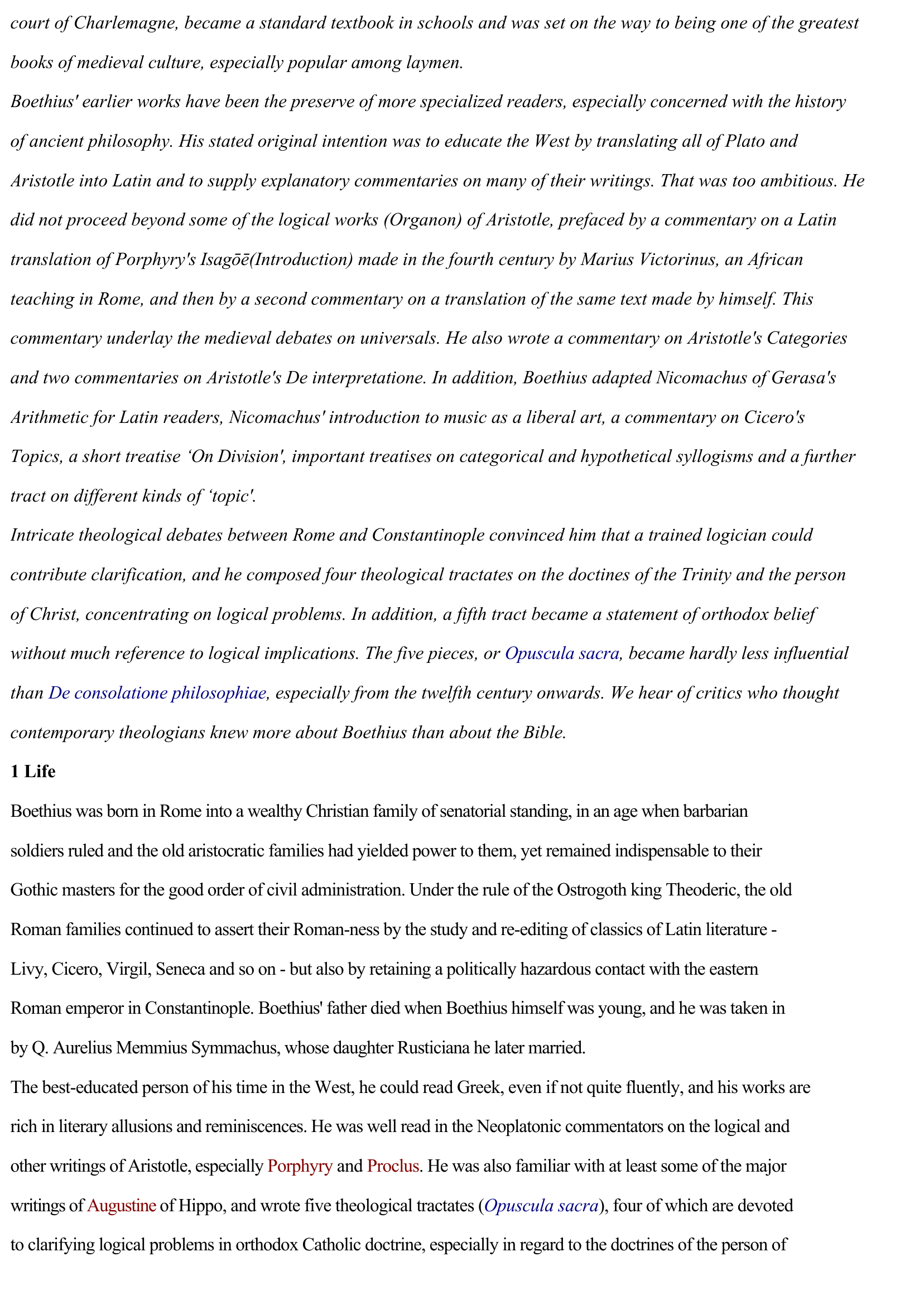Boethius, Anicius Manlius Severinus
Publié le 22/02/2012

Extrait du document
«
court of Charlemagne, became a standard textbook in schools and was set on the way to being one of the greatest
books of medieval culture, especially popular among laymen.
Boethius' earlier works have been the preserve of more specialized readers, especially concerned with the history
of ancient philosophy.
His stated original intention was to educate the West by translating all of Plato and
Aristotle into Latin and to supply explanatory commentaries on many of their writings.
That was too ambitious.
He
did not proceed beyond some of the logical works (Organon) of Aristotle, prefaced by a commentary on a Latin
translation of Porphyry 's Isagōē (Introduction) made in the fourth century by Marius Victorinus, an African
teaching in Rome, and then by a second commentary on a translation of the same text made by himself.
This
commentary underlay the medieval debates on universals.
He also wrote a commentary on Aristotle 's Categories
and two commentaries on Aristotle 's De interpretatione.
In addition, Boethius adapted Nicomachus of Gerasa 's
Arithmetic for Latin readers, Nicomachus ' introduction to music as a liberal art, a commentary on Cicero 's
Topics, a short treatise ‘On Division' , important treatises on categorical and hypothetical syllogisms and a further
tract on different kinds of ‘topic' .
Intricate theological debates between Rome and Constantinople convinced him that a trained logician could
contribute clarification, and he composed four theological tractates on the doctines of the Trinity and the person
of Christ, concentrating on logical problems.
In addition, a fifth tract became a statement of orthodox belief
without much reference to logical implications.
The five pieces, or Opuscula sacra , became hardly less influential
than De consolatione philosophiae , especially from the twelfth century onwards.
We hear of critics who thought
contemporary theologians knew more about Boethius than about the Bible.
1 Life
Boethius was born in Rome into a wealthy Christian family of senatorial standing, in an age when barbarian
soldiers ruled and the old aristocratic families had yielded power to them, yet remained indispensable to their
Gothic masters for the good order of civil administration.
Under the rule of the Ostrogoth king Theoderic, the old
Roman families continued to assert their Roman-ness by the study and re-editing of classics of Latin literature -
Livy, Cicero, Virgil, Seneca and so on - but also by retaining a politically hazardous contact with the eastern
Roman emperor in Constantinople.
Boethius' father died when Boethius himself was young, and he was taken in
by Q.
Aurelius Memmius Symmachus, whose daughter Rusticiana he later married.
The best-educated person of his time in the West, he could read Greek, even if not quite fluently, and his works are
rich in literary allusions and reminiscences.
He was well read in the Neoplatonic commentators on the logical and
other writings of Aristotle, especially Porphyry and Proclus .
He was also familiar with at least some of the major
writings of Augustine of Hippo, and wrote five theological tractates ( Opuscula sacra ), four of which are devoted
to clarifying logical problems in orthodox Catholic doctrine, especially in regard to the doctrines of the person of.
»
↓↓↓ APERÇU DU DOCUMENT ↓↓↓
Liens utiles
- Biographie de BOÈCE (Anicins-Manlius-Torquatus-Severinus).
- Boethius of Dacia
- Encyclopedia of Philosophy: BOETHIUS AND PHILOPONUS
- A. Manlius Boèce
- MANLIUS (Mythologie)

































